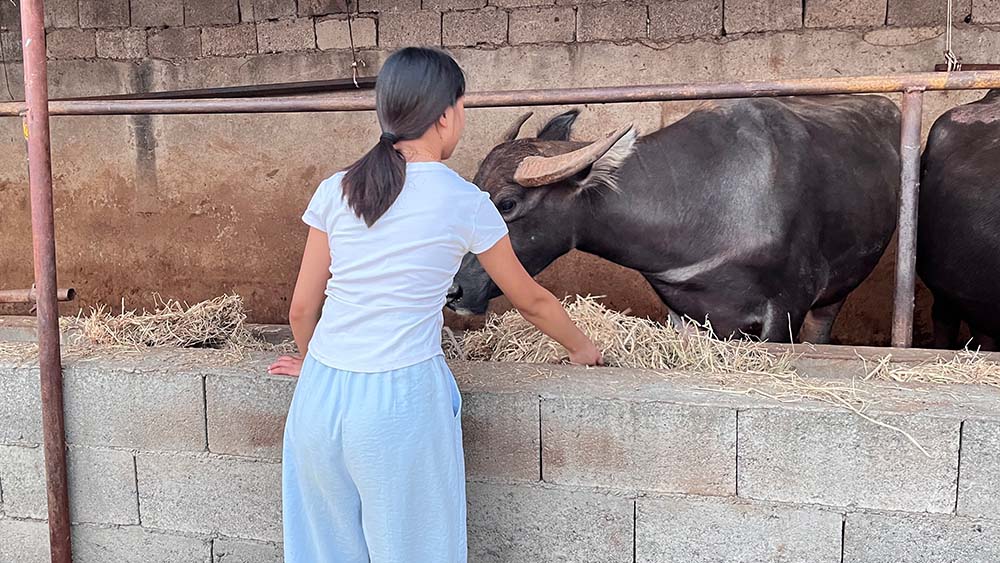In China, many young people struggling in a competitive job market return to their family homes and receive financial support from their parents. However, some do not merely stay idle or rely solely on their parents’ wealth. How does this situation provide them with the opportunity to launch businesses and achieve financial independence?
In the kitchen of her family home, 25-year-old Raphael Qian blends pre-cut strips of chicken breast and homemade goat cheese with various colours of fruit and vegetable powders. She then presses the mixture into moulds on a mint green baking mat before gently removing the shaped bites.
It looks like she’s preparing a special snack for her parents to enjoy after dinner. The biscuits are in delightful shapes like stars, animals and flowers. However, they are not for humans; they are for pets. These handcrafted treats are the heart of Raphael’s growing pet treat business.
“I couldn’t find a satisfying job and have been staying at my family home for over two years after graduation,” Raphael says. “One day, I stumbled upon videos about making pet treats online. It inspired me to start a pet treat business at home. I also have two cats and one dog.”
In China, some young people struggling to find jobs, like Raphael, return to their family home and receive financial support from their parents. They are known as “full-time children”.
A group titled “Full-time Children’s Work Communication Centre” boasts over 4,800 members on Douban, a popular Chinese internet forum. The hashtag “full-time children” has garnered over 4 million views on Xiaohongshu, China’s Instagram.

Not all full-time children simply depend on their parents’ wealth. Many are seeking opportunities to achieve financial independence. In the group on Douban, some members discuss ways to earn income from home. On Xiaohongshu, there are over 3,900 posts under the topic of “starting a business while unemployed at home”.
They are trying to run online stores, sell their handmade toys, become social media influencers or pursue freelance work like tutoring or illustration.
Raphael, who graduated from a university in the United States in 2022, couldn’t find a satisfying job in her hometown of Yixing, a county-level city in southern China.
“Most of the positions I found offered a base salary of only 2,600 yuan and required working on weekends. That amount isn’t enough, even in this small city,” she says. “I didn’t have much internship experience, and job hunting was especially tough after the pandemic. It was a real body blow for me.”

Like Raphael, staying at home provides struggling full-time children with the opportunity to start a business. Becoming social media influencers is also a path that many full-time children pursue to earn income. Faced with a difficult and unappealing job market, they prefer to stay at home and try to become bloggers rather than take on tiring, low-paying jobs.
Yang Juan is one of them. She left an unsatisfying job and wanted to take a break, so she returned to her family home in a village in east China’s Anhui province at the end of last year. After four months at home, she began job hunting but was unsuccessful.
One afternoon in late May, as she sat on a lounge chair in her family’s courtyard, fanning herself with a cattail leaf fan and gazing at the nearby green rice fields, she decided to pursue a career as a social media influencer sharing her rural life.
“I had this idea when I first moved back home, but I didn’t start it. At that time, I still planned to look for jobs later. In April and May, I tried looking for jobs but didn’t succeed. The tough reality finally pushed me to start this path,” Juan says.
It’s common to see full-time children sharing their daily lives at home on Xiaohongshu and Douyin, the Chinese version of TikTok. Some of them aim to earn an income as they gain more followers and video views. These videos, which showcase their relaxing lifestyles, resonate with struggling Chinese people and are therefore quite popular.

Staying at home offers full-time children the ideal condition to succeed as social media influencers. They invest little and take on less risk. Free from financial strain, these potential social media influencers can focus on creating content for their audience. For those who live in the countryside, this situation especially adds a unique highlight to their videos.
Juan focuses on sharing her interesting life in her rural hometown to attract viewers. She helps her parents with household chores, goes to the local market for supplies and works on the farm. Her parents run a cattle farm with several sheds and around 100 cows.
Juan loads square hay bales onto a wheelbarrow and transports them to the cattle sheds. She can move three large bundles at a time. After unloading the hay, she distributes it into the troughs for the cows to eat.
Staying at her family home in the countryside is cost-saving as a content creator in her niche. “I don’t need to invest much. I just record my life at home, on my parents’ cattle farm, or at my uncle’s orchard, using my phone and a tripod,” she says. “I don’t need to rent a villa in the countryside like some other bloggers do. I have my parents’ house and the most authentic rural life.”

For full-time children as entrepreneurs, staying at home is cost-effective because they can save on rent and other expenses. Raphael benefits from this. She mainly sells her pet treats online and sets up stalls at pop-up markets. “By making the treats in my family’s kitchen, I don’t have to pay extra rent or utility bills, which saves a lot of money,” she says.
Family members provide unpaid labour, which helps reduce business costs. Gordon Grigg, a business consultant, says that while they may do menial things, their help can greatly lighten the workload and ease the budget burden . Raphael’s mum and the family nanny often help by overseeing the pet treat baking times and handling tasks like washing and cutting the meat for the jerky.
Raphael can also call on younger family members with free time to assist her. Once, Raphael set up her stall at a commercial block at night, and her niece came to help her sell dog treats.
They pushed a white cart decorated with yellow string lights. Inside, various coloured baskets held an array of pet treats like biscuits, jerky and more. “Having support from my family feels great,” she says. “My niece and her classmates were excited to help out. Sometimes, I felt shy about introducing my treats to passersby, but they were great at chatting with everyone and bringing in curious customers.”

Full-time daughters don’t worry about not having a stable income in the early stages of their business because their parents cover their living costs. With no financial risks to bear, they’re less afraid of failure. “Living at the family home means I don’t have a lot of expenses. I’m also grateful to my parents. They support me financially, so I don’t have to stress about money,” Juan says.
Starting a business is inherently risky, and many potential entrepreneurs are held back by financial instability and the fear of failure, says Adrian Volenik, a writer from UBI (Universal Basic Income) Advocates. UBI provides everyone with a guaranteed minimum income to cover their basic needs, regardless of their employment status.
This stable income floor acts as a safety net, giving them the security they need to take risks and start a business. Similarly, staying at home can offer full-time children a form of financial security.
With their basic needs covered, full-time children can focus more on their business ideas and less on making ends meet. Raphael says, “The money I earn isn’t enough to fully support myself, but since my parents support me financially, I can concentrate on growing my business without much pressure.”

For full-time children, receiving guidance from their parents for their entrepreneurial ventures offers a significant advantage compared to those who start a business on their own. Having parents at home can be like having experienced mentors, according to Gordon.
Juan gets suggestions from her mum about the videos she shares on social media platforms. They sit together on the sofa in the living room and brainstorm video content. Her mum often contributes great ideas.
Once, they created a video with the theme of “taking photographs at the lotus pond with mum”, which gained plenty of views. “This is an opportunity I have because I’m staying at home. My mum’s suggestions help make my videos about rural life more distinctive,” she says.
This is an opportunity I have because I’m staying at home.
Raphael’s parents, who have run a company for many years and have abundant experience, offer guidance to their daughter. At first, Raphael planned to run a creative restaurant. Her dad advised that it would require too much investment and energy, with slow returns in the current economic climate. She then turned to the more practical option of a pet treat business.
As her pet treat business grows, Raphael often consults her parents on the next steps. “When I talk to my parents about my plans, like whether I should open a physical store alongside managing my online orders, they always give me insightful advice,” she says.
Raphael, who graduated with a bachelor’s degree in Hospitality Management and a master’s degree in International Trade, also helps with her parents’ company, which is based in a city near her hometown. She says this experience is valuable for her own pet treat business.
As part of her role, she compares the prices of raw materials across different cities and makes purchases in her home city when needed. “The knowledge I gained from university is not enough for real-world situations. This practical experience sharpens my sense and ability to manage budgets and reduce expenses,” Raphael says.

Emotional support from family is crucial in the entrepreneurial journey, according to Gordon.
Raphael feels the same. “I still remember the first order I received. I made 11 yuan. My mum gave me a thumbs-up and my usually serious dad cracked a smile,” she says. This support encourages her to keep going with her small business.
Some full-time children feel ashamed of not having a proper job and just staying at home. They are also criticised by netizens for “freeloading off their parents’ wealth”. These feelings and criticisms motivate them to seek any opportunity to earn an income.
Raphael doesn’t want to spend all her time on household chores or simply accompanying her family. She hopes to become financially independent. “I don’t want people around me to think I’m doing nothing and just living off my parents,” she says.

Entrepreneurial ventures aren’t always easy for full-time children, as they face various challenges. Raphael has been struggling with marketing and promotion. She took photos of her products and posted them on social media platforms like Xiaohongshu and Douyin to promote her pet treat business, but the results were disappointing.
Once, Raphael shared photos of the birthday cakes she made for dogs in a local dog group on WeChat, China’s most popular messaging and social media app, but felt frustrated when many pet owners replied, “Where did you buy this cake?” and “I can’t believe Yixing has a pet bakery”.
She says, “I’ve been running my business for over a year, but marketing is still a problem. Many pet owners in my city still don’t know my pet treat business exists.”

Raphael is trying a new strategy on her Xiaohongshu account to tackle the marketing challenge. She encourages her customers to share photos of their dogs enjoying the treats she made. Each day, she posts a photo of one dog with the headline “100 Dogs Eating My Treats Challenge” to attract attention.
Juan also struggles on her path as a social media influencer. She’s been working on her account since June, but after over a month, the number of followers and video views hasn’t reached the ideal level. “The biggest challenge is the lack of traffic. But it’s just at the beginning. I’ll keep figuring out how to create more engaging videos,” she says.
Juan is refining her approach to create more engaging videos. She discusses her content with her followers and seeks their advice on how to make it stand out. She also analyses similar bloggers in her niche to learn what content works well.
Since I’ve been at home without a job for a long time, I might as well give this a try
According to Adrian, the safety net of UBI affords potential entrepreneurs the time they need to come up with ideas, plan and make them happen. Similarly, being full-time children gives young people the time to develop their business ideas.
Juan plans to continue building her career as a social media influencer for several more months. “Since I’ve been at home without a job for a long time, I might as well give this a try. I have the time to let my social media account develop,” she says.
Raphael is now preparing to expand her business as online orders increase. She plans to open a pet treat studio in a storefront that her father no longer uses. The renovation costs for the studio are also being covered by her parents.
“I dream of becoming the go-to pet treat store in my town. I want to earn more money and repay my parents for the support they’ve given me,” she says. “I also hope to support myself with my own income in the future and no longer be a full-time daughter.”

